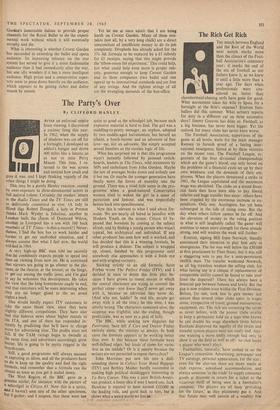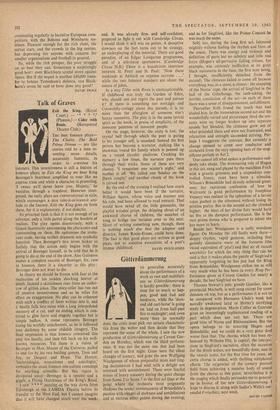The Rich Get Rich
The Football Association, supervisors of the game at all levels, waits for the team manager Ramsey to furnish proof of a lasting inter- national resurgence, hinted at by three victories on the recent tour. The Football League, or- ganisers of the four divisional championships which are the game's blood, can only brood on the problems of a financial cycle set up by their own weakness and the demands of their em- ployees. When the players threatened a strike in 1961, the League capitulated and the maximum wage was abolished. The clubs on a sound finan, cial basis then have been able to pay liberal salaries and huge transfer fees since: others have been crippled by the enormous increase in penditure. Only one, Accrington, has yet been submerged in the tide of rising costs. But the day when others follow cannot be far off. And the elevation of money to the ruling position in what is still laughably called 'the game' will continue to mean more strength for those already strong, and will weaken the weak still further.
Everton, signing Hill frdm Norwich, blandly announced their intention to play him only in emergencies. The fee was well below the £30,000 at first proclaimed by Fleet Street, but it was still a staggering 'sum to pay for a semi-permanent twelfth man. The transfer weakened Norwich, as all big transfers weaken the selling club, for What lasting use is a' cheque if replacements of Comparable ability cannot be found to take over from the departed? There .has always been a financial gap between famous and lowly. But the gap is now evident even within the First Division. Bolton, for one, took less in gate money last season than several other clubs spent in wages alone, irrespective of travel, ground maintenance, equipment, etc. The rich are cornering the talent as never before, with the poorer clubs unable, to keep a permanent hold on a man who knows he can double his wage elsewhere (even before, Eastham disproved the legality of the retain and transfer system players were not really tied. Any- one wanting a move badly enough had only to show it on the field as well as off : no club keeps a player who won't play).
Footballers, naturally, have cashed in on the League's concession. Advertising, newspaper and TV earnings, personal appearances, for the star : even for the also-ran there are many meals at club expense, subsidised accommodation, and always someone 'in the trade' to supply consumer goods at discount in return for a ticket or the vicarious `thrill of being seen in a footballer's company. The players are all busy 'providing for the future,' as. they plaintively put it. And that future may well consist of a wealthy few
commuting regularly to lucrative European com- petition, with the. Boltons and Wrexhams no- where. Pleasant enough for the rich clubs, the surtax stars, and the crowds in the big centres, but depressing for anyone with concern for smaller organisations and football in general.
So, while the rich prosper, the poor struggle on as best they can. Sometimes a surprisingly good best: even Blackburn scored seven against Spurs. But if the sequel is another £40,000 trans- fer to bolster Tottenham's defence, can Black- burn's seven be said to have done any good?
DAVID PROLE







































 Previous page
Previous page